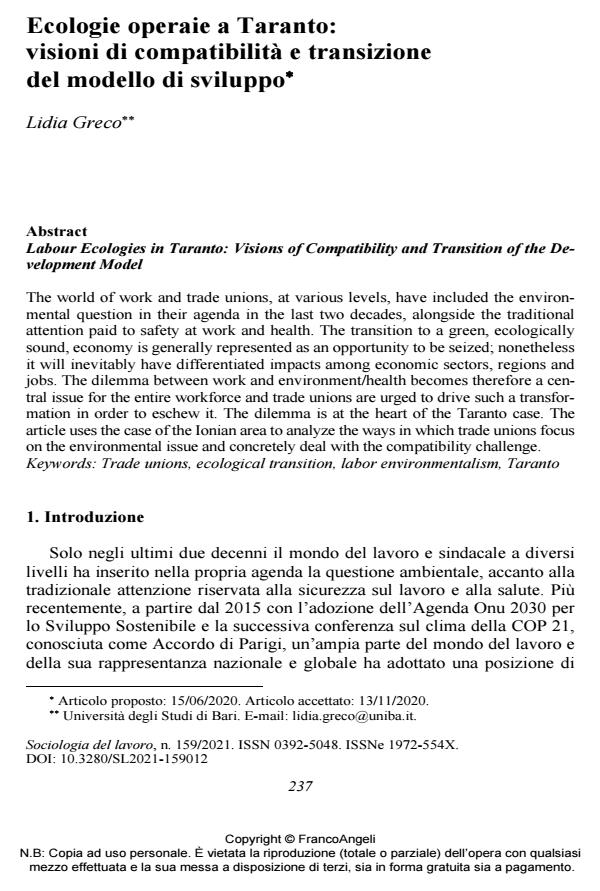Labour Ecologies in Taranto: Visions of Compatibility and Transition of the Development Model
Journal title SOCIOLOGIA DEL LAVORO
Author/s Lidia Greco
Publishing Year 2021 Issue 2021/159
Language Italian Pages 22 P. 237-258 File size 225 KB
DOI 10.3280/SL2021-159012
DOI is like a bar code for intellectual property: to have more infomation
click here
Below, you can see the article first page
If you want to buy this article in PDF format, you can do it, following the instructions to buy download credits

FrancoAngeli is member of Publishers International Linking Association, Inc (PILA), a not-for-profit association which run the CrossRef service enabling links to and from online scholarly content.
The world of work and trade unions, at various levels, have included the environ-mental question in their agenda in the last two decades, alongside the traditional attention paid to safety at work and health. The transition to a green, ecologically sound, economy is generally represented as an opportunity to be seized; nonethe-less it will inevitably have differentiated impacts among economic sectors, regions and jobs. The dilemma between work and environment/health becomes therefore a central issue for the entire workforce and trade unions are urged to drive such a transformation in order to eschew it. The dilemma is at the heart of the Taranto case. The article uses the case of the Ionian area to analyze the ways in which trade unions focus on the environmental issue and concretely deal with the com-patibility challenge.
Keywords: Trade unions, ecological transition, labor environmentalism, Taranto
- Esperienza operaia dell'ecologia e ambientalismo del lavoro all'Italsider/Ilva di Taranto. Dagli anni Cinquanta al 2018 Emanuele Leonardi, in SOCIOLOGIA DEL LAVORO 165/2023 pp.155
DOI: 10.3280/SL2023-165008 - La giusta transizione tra questione sociale e questione ambientale: il potenziale ecologico delle mobilitazioni operaie Emanuele Leonardi, in GIORNALE DI DIRITTO DEL LAVORO E DI RELAZIONI INDUSTRIALI 177/2023 pp.99
DOI: 10.3280/GDL2023-177007 - Socio-economic institutions for the green transition. Comparing labour strategies in Italy and the Netherlands Luca Novelli, Renata Semenza, in Transfer: European Review of Labour and Research 10242589261421803/2026
DOI: 10.1177/10242589261421803 - La retorica dei green jobs Renata Semenza, in GIORNALE DI DIRITTO DEL LAVORO E DI RELAZIONI INDUSTRIALI 175/2023 pp.359
DOI: 10.3280/GDL2022-175003
Lidia Greco, Ecologie operaie a Taranto: visioni di compatibilità e transizione del modello di sviluppo in "SOCIOLOGIA DEL LAVORO " 159/2021, pp 237-258, DOI: 10.3280/SL2021-159012